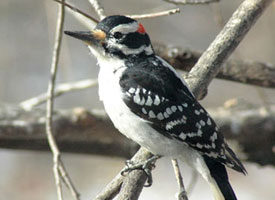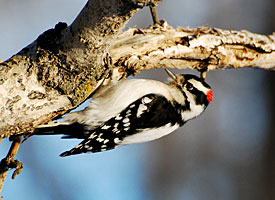 |
| Hairy Woodpecker Cornell Lab of Ornithology |
The Saturday afternoon of the Geography of Hope Conference on Aldo Leopold sponsored by Point Reyes Bookstore last weekend, offered field trips. I chose the Mt. Wittenberg hike because it was strenuous and one of my favorite hikes in the world. As it turned out, to use one of the phrases from Leopold, it was also an experience in thinking like a mountain.
The hike was led by Inverness native Todd Plummer, an birder and conservationist who demonstrated an intimacy with the mountain that only a local could know. Although I had taken this hike many times in my life, I never hiked it like we did that day.
 |
| Downy Woodpecker Cornell Lab of Ornithology |
There were thirteen of us in the group, people who had traveled to the conference from all over the United States. Most were committed conservationists. Being a Jungian analyst and a Biodynamic farmer, I am not immersed in the culture of foresters or biologists. Many in our group were those people and were knowledgeable of and capable in the natural world and, I might add, actually able to hike the 3-5 miles of that loop. As we walked, Todd pointed out birds, many of them birds we only heard. To point them out, he often imitated their calls.
That was true for me this day. As I listened to distinguish the call of the hairy woodpecker from that of the downy woodpecker, birds, Todd told us, that are almost impossible to distinguish by their markings, I realized how much I depend on sight. Listening affords experience that can so easily get bypassed. Perhaps it is not sight itself as much as it is what I do automatically. Listening to the unique variations summons a presence within to pay attention.
Not that we were quiet all the time! An important part of the hike was getting know each other. We chattered with each other all the way to the top, spinning stories and webs of new connections. Time and again Todd stopped us, tuning us in to a bird call. Slowly I felt more like the animal I am, alert, listening to who else (besides humans!) was also there. Even my sight seemed sharpened.
At the top of Mt. Wittenberg we sat in a circle as Todd gave us each a card to write a few words about our experience. We then read them to each other, and later Todd e-mailed them to each us, along with the names of 41 birds we heard that day. The hike grounded the conference for me.
In his seminal work, A Sand County Almanac (1949), Aldo Leopold states, “…a land ethic changes the role of Homo sapiens from conqueror of the land-community to plain member and citizen of it. It implies respect for his fellow-members, and also respect for the community as such (240).”
After we descended and walked the final flat stretch back to the parking lot, I knew a little more about who was sharing this piece of earth with me. I felt alive, alert, and very present. I thought of Richard Wilhlem’s translation of the I Ching’s hexagram 52, “keeping still, mountain.” When one divines this hexagram, the action is going within and being solidly grounded in the present moment. The challenging hike and lively conversations punctuated by moments of quiet listening to birdsong paradoxically afforded this. Did we each experience a little of the flame of fierce green fire so important to how mountains think?
This year the Geography of Hope Conference: Practice of the Wild, held March 15-17, 2013 in Point Reyes, CA, feathered the seminal environmental work of Aldo Leopold (Igniting the Green Fire: Finding Hope in Aldo Leopold’s Land Ethic). It was sponsored by Point Reyes Book Store, the Center for Humans and Nature, The US Forest Service, and the Aldo Leopold Foundation.
